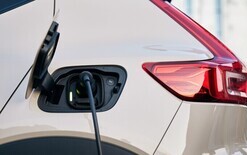Marque makes green strides

Toyota New Zealand has recommitted to reducing carbon dioxide (CO2) emissions across its business.
Its 2024 sustainability report states that means across the company’s operations through to the lifetime emissions of new vehicles it sells.
Toyota says it’s serious about its responsibility to contribute to the reduction of greenhouse gases from the transport sector.
It is aiming for a 46 per cent reduction of emissions by 2030 based on its 2019 benchmark year. Further ahead, it has set itself a target of being net-carbon zero by 2050 in line with the New Zealand government’s commitment to the Paris Agreement.
Tatsuya Ishikawa, pictured, acting chief executive, says the company is committed to decarbonisation by offering sustainable products and services.
“We have set ourselves an ambitious CO2 reduction target, one that forces change on us,” he adds. “But we also acknowledge there will be challenges along the way.”
Two years into its decarbonisation plan, Toyota NZ reports that operational emissions are on track to meet its end-of-decade target. Initiatives to use more renewable energy and install solar panels at its dealerships is paying off from a carbon point of view.
However, reducing tailpipe emissions from vehicles it sells is more challenging because there are several factors that will determine the success or not of reaching the goal.
At this stage, six years out from 2030, Toyota is forecasting a 37 per cent reduction in tailpipe pollution or a nine per cent shortfall of its target.
The target for the end of this decade is based on current business projections, and a sales mix of mostly hybrid, plug-in hybrid and zero-emitting models.
Ishikawa says: “Meeting the 46 per cent target will depend on a range of factors, many of which are outside of our control, such as access to low or zero-emitting products, customer demand for zero-emissions cars, economic conditions, infrastructure growth, increased competition and regulatory settings.
“But we are not resiling from our target. We will continue to electrify our portfolio and have passed the halfway point, with 55 per cent of Toyota new-vehicle sales now electrified in the form of hybrid, plug-in hybrid or battery EV. We are targeting 85 per cent by 2027 and 90 per cent by 2030.”
The long-term success of the decarbonisation plan will be closely linked to customer take-up of battery and zero-emissions vehicles, as well as charging station roll-out and technology developments such as longer-range batteries.
As well as low-emitting vehicles, Toyota NZ is pursuing other zero-carbon initiatives with its investment into the hydrogen economy. It helped develop hydrogen fuel-cell chase boats for the America’s Cup, has imported hydrogen-powered electricity generators and continues to grow its hydrogen fuel-cell Mirai car-sharing programme in Auckland.
Ishikawa says for Toyota, sustainability means delivering exceptional customer service, valuing its business connections and meeting the needs of customers.
“When we think of sustainability, we consider environmental care, societal impact, and, importantly, long-term economic prosperity,” he explains. “The need to strike the right balance between all these impact areas is at the core of our business.”
Toyota’s vision is to evolve from a traditional car company to a mobility company, benefiting society and future generations through collaboration and diversification.
“Our goal is to enable our customers to make informed choices based on their functional needs, safety, affordability and emissions. At the same time, we are ensuring that sustainability is accessible and practical for a wide audience.”
Toyota says is has a responsibility to Kiwis to reflect and uphold the values that they care about. With more than 60 Toyota Stores around the country, it’s involved in communities in many supportive and meaningful ways.
All dealerships contribute to local clubs, sports and community organisations, while Toyota NZ show its support through several national partnerships.
The 2024 Toyota NZ Sustainability Report is available now on the company’s website. The report focuses on a wide range of environmental and social initiatives, including recycling efforts, low-carbon fuels used by Toyota Gazoo Racing and social programmes, such as RYDA youth-driver training.





